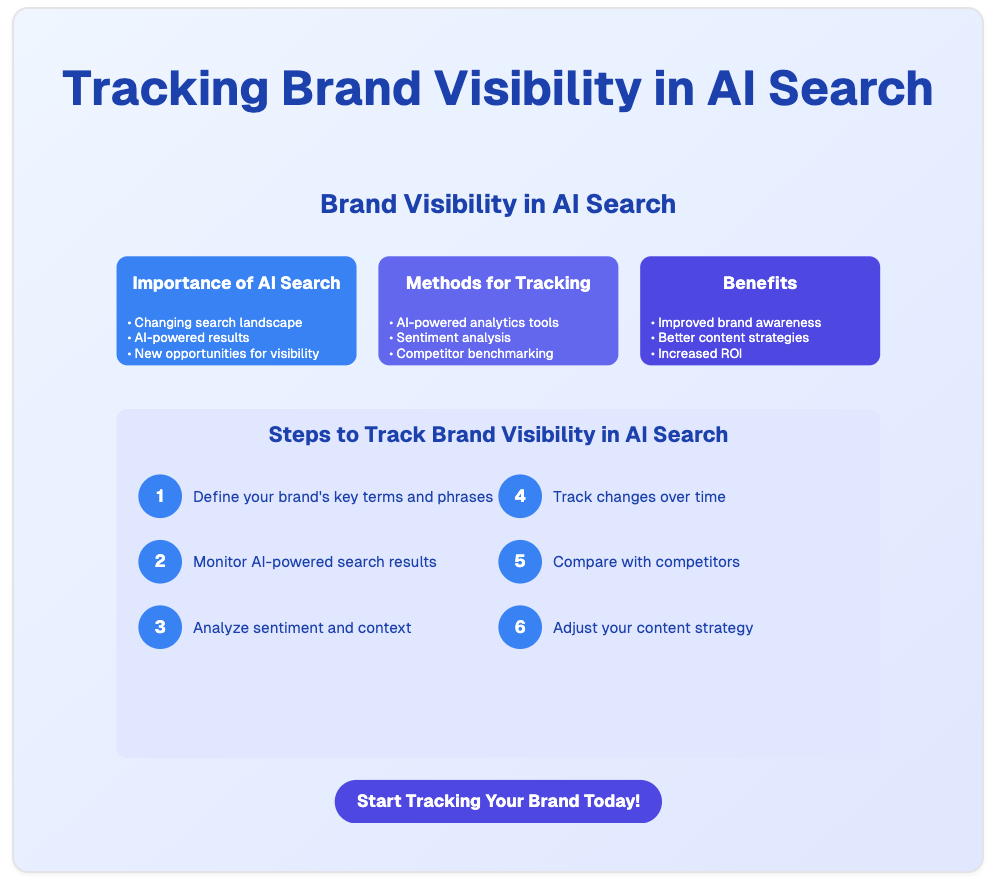10 Effective Ways to Track Your Brand's Visibility in AI-Powered Search Results
In the rapidly evolving digital landscape, AI-powered search results are becoming increasingly important for brand visibility. As large language models (LLMs) and AI assistants reshape how users find information, it's crucial for businesses to adapt their tracking methods. This post explores ten effective strategies to monitor and improve your brand's presence in AI-driven search environments.
1. Utilize AI-Specific Visibility Tools
Several tools are emerging that specifically track brand mentions in AI-generated responses. These tools simulate user queries and analyze the results to determine if and how your brand appears.
- LLM Search Performance Tracker: This tool allows you to input your domain and generates relevant prompts to test your brand's visibility in AI responses.
- AI Content Detector: While primarily used to identify AI-generated content, some of these tools can also help you understand how AI systems perceive and categorize your brand's content.
2. Monitor AI-Generated Summaries
AI systems often provide summaries of web content. Tracking how your brand appears in these summaries can offer insights into your visibility.
- Use AI summarization tools: Apply these to your own content and competitor content to see how AI systems are likely to present information about your brand.
- Analyze featured snippets: While not AI-generated, featured snippets on traditional search engines can indicate how your content might be summarized by AI.
3. Leverage Traditional SEO Tools with an AI Focus
Many SEO tools are adapting to include AI-specific metrics. Use these to gauge your brand's potential visibility in AI search results.
- SEMrush's AI Writing Assistant: While designed for content creation, this tool can provide insights into how AI systems interpret and value different types of content.
- Moz's Page Optimization: Look at how well your pages are optimized for featured snippets, as this can correlate with visibility in AI responses.
4. Conduct Regular AI-Assisted Competitor Analysis
Use AI tools to analyze your competitors' content and compare it to your own. This can help you understand why certain brands might be more visible in AI search results.
- AI-powered content analysis tools: These can help identify patterns in high-performing content that may be favored by AI search systems.
- Sentiment analysis: Use AI to analyze the sentiment around your brand and competitors in various online contexts.
5. Implement AI Chatbots for User Interaction Data
By implementing AI chatbots on your own platforms, you can gather valuable data on how users interact with AI when seeking information about your brand or industry.
- Analyze common queries: Identify the types of questions users frequently ask about your brand or products.
- Monitor chatbot performance: Track how well your AI chatbot represents your brand and provides accurate information.
6. Track Brand Mentions in AI-Generated Content
As AI systems increasingly generate content, it's important to monitor how and where your brand is mentioned in this AI-created material.
- Use brand monitoring tools: Adapt existing brand monitoring strategies to include AI-generated content sources.
- Analyze AI content platforms: Keep an eye on platforms that host AI-generated content to see how your brand is represented.
7. Assess Voice Search Compatibility
Many AI-powered searches are conducted via voice assistants. Ensure your brand is optimized for these voice-based AI interactions.
- Conduct voice search tests: Regularly test how your brand appears in voice search results.
- Optimize for natural language: Ensure your content is structured to answer questions in a conversational manner.
8. Monitor AI-Curated News and Information Feeds
AI systems often curate personalized news and information feeds. Track your brand's presence in these AI-curated environments.
- Use AI news aggregators: Regularly check how and if your brand appears in AI-curated news feeds.
- Analyze content recommendation systems: Study how AI recommends your content compared to competitors.
9. Utilize AI for Predictive Brand Visibility Analysis
Leverage AI's predictive capabilities to forecast potential changes in your brand's visibility.
- AI-powered trend analysis: Use AI tools to identify emerging trends that could affect your brand's visibility.
- Predictive SEO tools: Some advanced SEO tools use AI to predict future ranking factors, which can be indicative of AI search visibility.
10. Implement Continuous AI Learning and Adaptation
Stay updated with the latest developments in AI search technology and continuously adapt your strategies.
- Follow AI research publications: Keep abreast of the latest AI algorithms and how they might affect search results.
- Participate in AI-focused webinars and conferences: Gain insights from experts in the field of AI and search technology.
Conclusion
Tracking your brand's visibility in AI-powered search results requires a multifaceted approach. By combining traditional SEO practices with AI-specific strategies, you can ensure your brand remains visible and relevant in the age of AI-driven search. Remember, the key is to continuously adapt and refine your methods as AI technology evolves.
